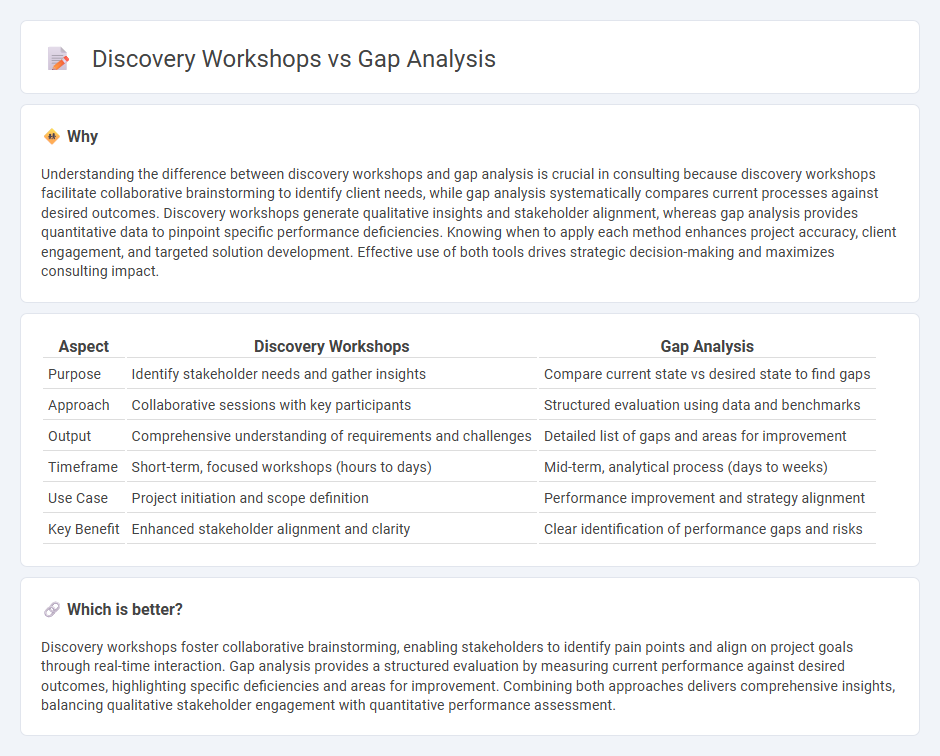
Discovery workshops facilitate collaborative sessions to identify client needs, project goals, and stakeholder perspectives, promoting alignment early in the consulting process. Gap analysis systematically evaluates the differences between current capabilities and desired outcomes to pinpoint areas for improvement and define strategic priorities. Explore how discovery workshops and gap analysis complement each other to enhance consulting effectiveness.
Why it is important
Understanding the difference between discovery workshops and gap analysis is crucial in consulting because discovery workshops facilitate collaborative brainstorming to identify client needs, while gap analysis systematically compares current processes against desired outcomes. Discovery workshops generate qualitative insights and stakeholder alignment, whereas gap analysis provides quantitative data to pinpoint specific performance deficiencies. Knowing when to apply each method enhances project accuracy, client engagement, and targeted solution development. Effective use of both tools drives strategic decision-making and maximizes consulting impact.
Comparison Table
| Aspect | Discovery Workshops | Gap Analysis |
|---|---|---|
| Purpose | Identify stakeholder needs and gather insights | Compare current state vs desired state to find gaps |
| Approach | Collaborative sessions with key participants | Structured evaluation using data and benchmarks |
| Output | Comprehensive understanding of requirements and challenges | Detailed list of gaps and areas for improvement |
| Timeframe | Short-term, focused workshops (hours to days) | Mid-term, analytical process (days to weeks) |
| Use Case | Project initiation and scope definition | Performance improvement and strategy alignment |
| Key Benefit | Enhanced stakeholder alignment and clarity | Clear identification of performance gaps and risks |
Which is better?
Discovery workshops foster collaborative brainstorming, enabling stakeholders to identify pain points and align on project goals through real-time interaction. Gap analysis provides a structured evaluation by measuring current performance against desired outcomes, highlighting specific deficiencies and areas for improvement. Combining both approaches delivers comprehensive insights, balancing qualitative stakeholder engagement with quantitative performance assessment.
Connection
Discovery workshops facilitate in-depth stakeholder engagement to uncover current challenges, goals, and processes, forming the foundation for accurate Gap analysis. Gap analysis builds on insights gathered during discovery workshops to identify disparities between the existing state and desired outcomes, enabling targeted strategic planning. Integrating both approaches enhances consulting effectiveness by aligning business objectives with actionable improvement opportunities.
Key Terms
Current State Assessment
Gap analysis focuses on identifying discrepancies between the current state and desired future state, emphasizing clear measurement of performance gaps and resource allocation. Discovery workshops involve collaborative sessions with stakeholders to gather detailed insights about current processes, challenges, and organizational needs, enhancing the accuracy of the Current State Assessment. Explore how both methodologies complement each other to deliver a comprehensive understanding of your business environment.
Stakeholder Engagement
Gap analysis identifies discrepancies between current and desired project states by engaging key stakeholders through structured interviews and documentation reviews, ensuring alignment with organizational goals. Discovery workshops actively involve stakeholders in collaborative sessions to gather insights, foster consensus, and prioritize requirements for transformative initiatives. Explore innovative strategies to maximize stakeholder engagement and drive project success.
Requirements Identification
Gap analysis identifies discrepancies between current capabilities and desired outcomes, emphasizing precise requirements identification to address business needs. Discovery workshops engage stakeholders to collaboratively explore and gather detailed requirements, uncovering hidden challenges and opportunities. Explore how combining these approaches enhances comprehensive requirements gathering and project success.
Source and External Links
Gap analysis - Wikipedia - Gap analysis is a formal study comparing a business's current performance with its desired or potential performance to identify gaps and areas for improvement at strategic or operational levels.
How Gap Analysis Can Drive Strategic Change in Your Business - Harvard Business School Online - Gap analysis measures the difference between current operations and ideal performance by defining current and desired states, identifying gaps, and analyzing root causes for strategic improvement.
What is gap analysis and how does it work? - TechTarget - Gap analysis involves assessing current processes and performance against target objectives, collecting relevant data, and developing a comprehensive plan to close the identified gaps.
 dowidth.com
dowidth.com